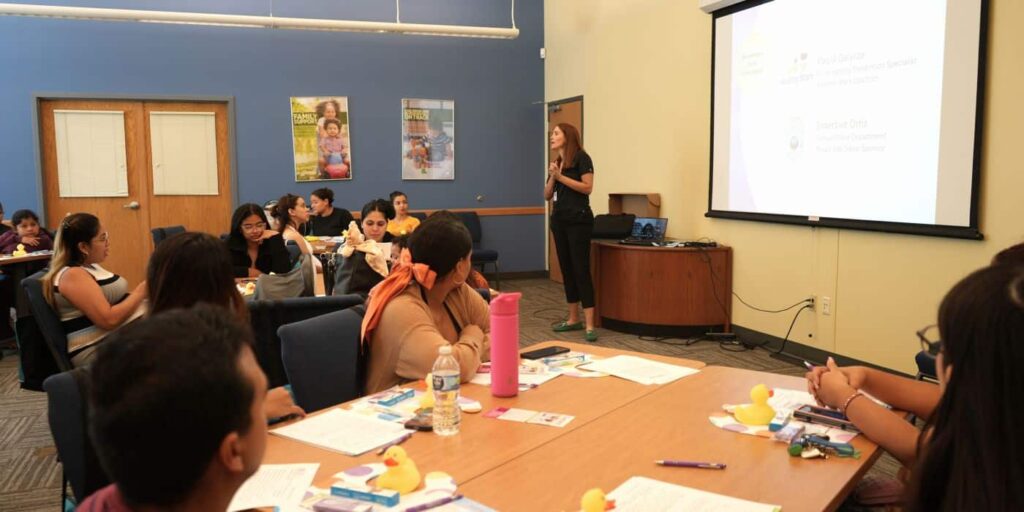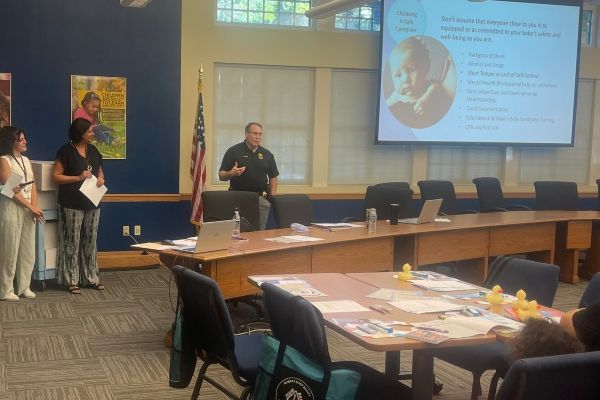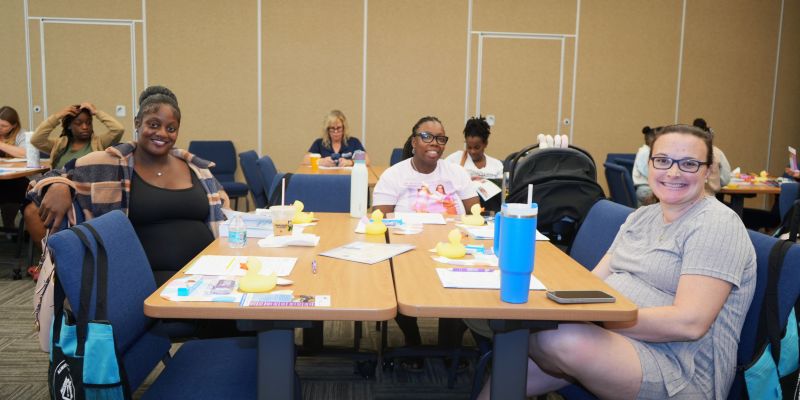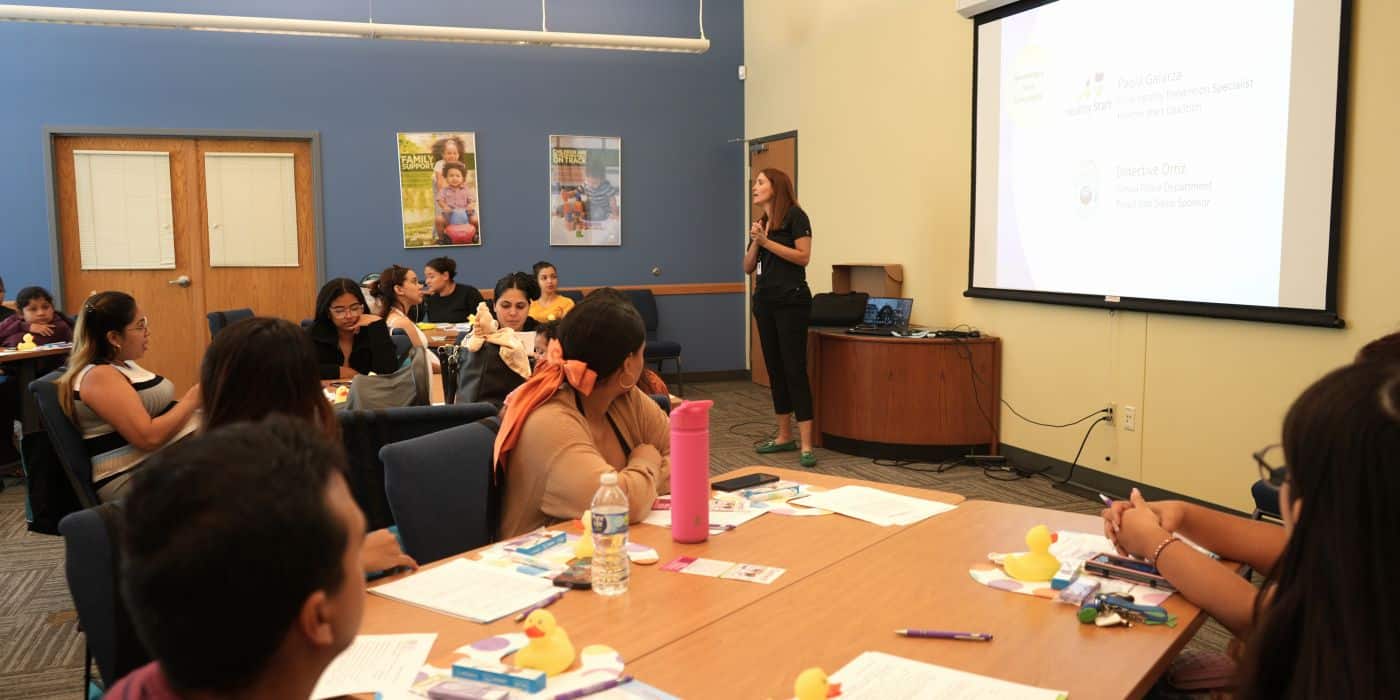At the end of Healthy Start Coalition of Hillsborough County’s community education course on protecting babies from preventable deaths, Jessica Reynolds shares a message with the class of young families and mothers-to-be.
“I hope that we have not scared you to death,” she says.
 Healthy Start Coalition of Hillsborough County’s Safe Baby program educates parents, caregivers about preventable infant deaths. (HSC)
Healthy Start Coalition of Hillsborough County’s Safe Baby program educates parents, caregivers about preventable infant deaths. (HSC)
As part of Healthy Start’s Safe Baby program, Reynolds, the organization’s Community Outreach Manager, and her colleague Ragdah Ali just spent more than an hour going over the types of mistakes by parents and caregivers that too often end in tragedy. They include accidentally suffocating an infant while co-sleeping, shaking a baby, choosing an unfit babysitter, and distracted parenting.
The October 15th training session was a special safe sleep education event to coincide with National Safe Sleep Awareness Month. Forty families gathered for the class at the Ybor City offices of the Children’s Board of Hillsborough County, which funds Healthy Start’s Safe Baby program. The course was offered in English and Spanish in separate rooms. Similar classes are held every three months at one of the Children’s Board Family Resource Centers around Hillsborough County.
Reynolds tells the crowd that unexplained deaths from SIDS, or sudden infant death syndrome, are extremely rare.
“We had 18 sleep-related deaths last year (in Hillsborough County) and none of them were SIDS,” she says. “They were all suffocation. That’s an empowering fact for all of us. We can prevent suffocation.’’
Reynolds and Ali went over the leading causes of death for some 3,600 infants across the country each year, and how to prevent them.
Most of the suffocation deaths are related to “co-sleeping,’’ or having the baby sleep in the bed with a parent or caregiver. A newborn’s neck muscles aren’t developed enough for them to move their heads, and they can’t breathe if their faces are pressed against bedclothes, pillows, or a parent. Sleeping in the same room with the baby is fine, just not in the same bed.
A baby should be placed on its back in a crib, bassinet, or portable crib with nothing else in the bed – no pillows, blankets, toys, or bed bumpers.
Reynolds warns the crowd about the dangers of inclined sleepers, in which babies’ heads droop forward, cutting off their air supply. On a large projection screen at the front of the room, she displays a picture of a Fisher-Price inclined sleeper that was recalled in 2019 but can still be found at second-hand shops and elsewhere.
“So don’t buy it anywhere,’’ she says.
She urges parents to do their own research on product safety, even for new merchandise.
“Unfortunately, it takes a lot of deaths to recall an item,’’ she says.
“Don’t trust it because it’s sold at the store,” she advises. “It doesn’t mean it’s safe. They’re always trying to put something else on the market and solve a so-called problem that may not exist.’’
To help provide a safe sleep area for their babies, parents and caregivers in the class received Cribette brand baby-safe portable cribs donated to the Tampa Police Department, which, in turn, donated them to Healthy Start.
The session also covered shaken baby syndrome, another preventable and common cause of death that results from a caregiver getting frustrated, perhaps because the baby won’t stop crying, and shaking the child. Shaken baby can kill a child or lead to permanent damage, including blindness, intellectual disability, and cerebral palsy. Tampa Police Lt. Joseph Sustek tells the class it’s usually not a parent but someone taking care of an infant who shakes a baby. So choosing a babysitter carefully can truly be a matter of life or death.
 Tampa Police Lt. Joseph Sustek (HSC)
Tampa Police Lt. Joseph Sustek (HSC)
“It was someone that they quickly got, like an emergency came up,” Sustek says. “It could be a relative, or a friend, or someone to watch the child, and they don’t have the experience. They have some of these stressors they’re not used to, where you, as a parent, are used to these stressors. That’s why it’s very important when choosing who in a pinch takes care of your child to make sure that something like this doesn’t happen.’’
Reynolds says babies sometimes cry for two or three hours for no apparent reason. Caregivers can try swaddling them, which gives them a feeling of security like they had in the womb. But beyond checking frequently to make sure the baby doesn’t need changing or is hungry, sometimes there is nothing that can be done..
“I always say don’t try to soothe the baby if you’re already tired and frustrated,’’ Reynolds says. “Just put the baby down and take a break for yourself and walk away.’’
It’s always advisable to have someone trustworthy who can give the caregiver a break. Ali says parents should make sure the person knows how to care for a baby.
“Don’t assume that everybody knows how to take care of a baby,’’ she says. “Also, don’t assume that everybody close to you is as concerned with your baby’s well-being. As the number one protector, you are the main one that’s concerned with the baby’s well-being, so you want to make sure anybody that’s around your baby also is concerned that way.”
The Safe Baby packets provided at the session have a sheet to help group potential caregivers and babysitters into red, yellow, or green zones based on whether they are not safe at all, may not be safe, or are trusted and know how to care for a baby. The red zone may include people with a substance abuse problem or mental health condition. The yellow zone might include people the parents know well.
“So perhaps it’s like your best friend that you’ve known your whole life, but she has a short temper,” Ali says. “She’s around the baby, but you’re never going to leave her alone with the baby.”
The green zone is for trusted people who know how to care for babies.
 Forty families attended the safe sleep event. (HSC)
Forty families attended the safe sleep event. (HSC)
The class also delves into the dangers of distracted parenting, which include leaving a baby in a car or a bath.
Distracted parenting can also include paying attention to the cell phone instead of the baby. Babies learn by communicating and crave attention from their parents. During the class, a picture on the screen at the front of the room shows a mother and baby nearly nose to nose, the baby imitating the mom’s facial expression. If mom is on the phone, the baby loses that bonding and a learning opportunity that can help with their language and social-emotional development, Reynolds says.
“That baby’s learning and making brain connections that truly are going to last for a lifetime,’’ she notes. “All of those things we need as human beings to help us throughout the rest of our lives.’’
Healthy Start launched Safe Baby 12 years ago to train nurses at the birthing hospitals in Hillsborough County so they could instruct new parents. The organization expanded the classes to parents, parents-to-be, and caregivers about a year ago. The classes are held every three months. The Children’s Board covers these same lessons in the babysitting classes it conducts.
“It’s a lot of good information,’’ says Francesca Roch, an expecting mother who attended the class. “It’s kind of scary, the stuff that’s out there.’’
She and her husband, Leonardo Roch, are expecting their first child, a boy, at the end of October.
“But we’re kind of on baby watch right now, so maybe today,’’ Francesca says with a smile.
They heard about the classes from St. Joseph’s Hospital and found it reassuring that the instructors follow the guidelines of the American Academy of Pediatrics.
Julie Nily is expecting her second daughter in a little more than a month. Her first is almost 10, so Nily signed up for the class to make sure she’s up to date on everything. With her first child, she made the mistake of co-sleeping with the baby.
“Now I’ve learned that that’s not good,” Nily says.
Another participant, Jazmine Lovett, says she loved the class.
“It actually taught me a lot,” says Lovett, who’s expecting a baby girl.
She heard about the class from WIC, a federal program that provides supplemental food and information for women, infants, and children.
“Me, personally, I don’t really have the support that I need,’’ Lovett says. “Being here it helps me, knowing that I’ll have someone to go to if I need them.’’
For more information, go to Safe Baby.

